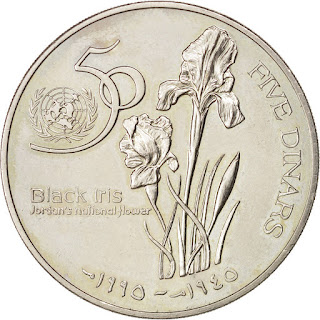Jordan Coins 5 Dinars 1995 50th Anniversary of the United Nations
Commemorative issue: 50th Anniversary of the United Nations
Obverse: Bust of King Hussein I, of the Hashemite Kingdom of Jordan.
Lettering: THE HASHEMITE KINGDOM OF JORDAN.
Reverse: The official emblem of the United Nations and Black Iris, Jordan's national flower.
Lettering: 50 Black Iris Five Dinars ١٩٩٥.
Edge: Reeded.
Composition: Copper-Nickel.
Weight: 28.4 g.
Diameter: 38.61 mm.
Thickness: 3.3 mm.
Shape: Round.
United Nations
The United Nations (UN) is an intergovernmental organization to promote international co-operation. A replacement for the ineffective League of Nations, the organization was established on 24 October 1945 after World War II in order to prevent another such conflict. At its founding, the UN had 51 member states; there are now 193. The headquarters of the United Nations is in Manhattan, New York City, and experiences extraterritoriality. Further main offices are situated in Geneva, Nairobi and Vienna. The organization is financed by assessed and voluntary contributions from its member states. Its objectives include maintaining international peace and security, promoting human rights, fostering social and economic development, protecting the environment, and providing humanitarian aid in cases of famine, natural disaster, and armed conflict.
During the Second World War, US President Franklin D. Roosevelt initiated talks on a successor agency to the League of Nations, and the United Nations Charter was drafted at a conference in April–June 1945; this charter took effect 24 October 1945, and the UN began operation. The UN's mission to preserve world peace was complicated in its early decades by the Cold War between the US and Soviet Union and their respective allies. The organization participated in major actions in Korea and the Congo, as well as approving the creation of the state of Israel in 1947. The organization's membership grew significantly following widespread decolonization in the 1960s, and by the 1970s its budget for economic and social development programmes far outstripped its spending on peacekeeping. After the end of the Cold War, the UN took on major military and peacekeeping missions across the world with varying degrees of success.
The UN has six principal organs: the General Assembly (the main deliberative assembly); the Security Council (for deciding certain resolutions for peace and security); the Economic and Social Council (ECOSOC) (for promoting international economic and social co-operation and development); the Secretariat (for providing studies, information, and facilities needed by the UN); the International Court of Justice (the primary judicial organ); and the United Nations Trusteeship Council (inactive since 1994). UN System agencies include the World Bank Group, the World Health Organization, the World Food Programme, UNESCO, and UNICEF. The UN's most prominent officer is the Secretary-General, an office held by South Korean Ban Ki-moon since 2007. Non-governmental organizations may be granted consultative status with ECOSOC and other agencies to participate in the UN's work.
The organization won the Nobel Peace Prize in 2001, and a number of its officers and agencies have also been awarded the prize. Other evaluations of the UN's effectiveness have been mixed. Some commentators believe the organization to be an important force for peace and human development, while others have called the organization ineffective, corrupt, or biased.
Hussein of Jordan
Hussein bin Talal (Ḥusayn bin Ṭalāl; 14 November 1935 – 7 February 1999) was King of Jordan from the abdication of his father, King Talal, in 1952, until his death. Hussein's rule extended through the Cold War and four decades of Arab–Israeli conflict. He recognized Israel in 1994, becoming the second Arab head of state to do so (after Anwar Sadat in 1978/1979).
Hussein claimed to be a descendant of the Islamic prophet Muhammad through his belonging to the ancient Hashemite family.
Black Iris - Iris nigricans
Iris nigricans is a flowering plant in the family Iridaceae. It is the national flower of Jordan. The flowers are blackish-purple and 12–15 centimetres (4.7–5.9 in) in diameter, and the plants are 35 cm (14 in) tall with recurved leaves. It needs direct sun and sharp drainage. It is endemic to Jordan and is an endangered species.
There are 8 other irises native to Jordan, and most of these are also endangered. The black species are sometimes confused with Iris nigricans.

